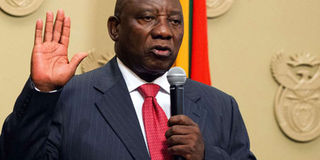African political parties can learn a lot from Jacob Zuma’s exit

South African President Cyril Ramaphosa. He urged security forces to "exercise maximum restraint". PHOTO | RODGER BOSCH | AFP
What you need to know:
- Yoweri Museveni squares with our knowledge of Uganda rather than the National Resistance Movement.
- In other words, it is not just that ANC supersedes individuals but that the party operates a predictable modus operandi.
The dramatic finale of the Jacob Zuma years and the dawn of the Cyril Ramaphosa era provide fodder for reflection on the state of African political parties.
In principle, parties are equal parts but weak structurally and bankrupt ideologically.
The totem poles around which party rank-and-file dance are dominant figures oftentimes party-cum-government presidents or acclaimed opposition leaders.
We know of Denis Sassou Nguesso of Republic of Congo, in power since 1979, not the Congolese Party of Labour.
President Paul Biya, 36 years in power, registers when we think of his country rather than the Cameroon People’s Democratic Movement.
ANC ELECTIONS
Yoweri Museveni squares with our knowledge of Uganda rather than the National Resistance Movement.
In essence, personality cults trump strong, institutionalised party structures and processes.
An exception is South Africa, as evidenced by the unfolding events in the African National Congress.
The ANC held elections in December, which saw Ramaphosa take the helm as party president, replacing Jacob Zuma.
The conundrum is that Zuma relinquished the party presidency but retained the position of head of state and government with Ramaphosa as his deputy – that is, until Wednesday.
TRANSITION
Ramaphosa’s ascendency touched off clamour for Zuma’s resignation of state presidency, failing which his hand would be forced by the party.
Constitutionally, Zuma had more than a year to continue as state president.
In the end, ANC was constrained to recall him, catalysing his reluctant resignation.
The leadership transition saga in ANC is nuanced and intricate.
To cut to the chase the fluid dynamics leading to Zuma’s exit speak to the exceptionalism of ANC and the rainbow nation vis a vis party politics practice and norms elsewhere in Africa.
In most African countries, a president would go to great lengths to retain power. In South Africa, fell on his sword when ANC pulled the rug under his feet.
PARTY INTERESTS
It boils down to a strong ANC constitution backed by traditions and conventions where personalities are secondary to party interests.
How do political parties in other countries fare in terms of keeping faith with constitutions?
This is a pertinent question because 2018 will witness presidential elections in Cameroon, DR Congo, Egypt, Madagascar, Mali, Mauritius, Sierra Leone, South Sudan and Zimbabwe.
Save for Mauritius, these are fragile democracies where missteps during polls can touch off civil strife.
And, the missteps often begin at party level.
PATRONAGE
It does not inspire confidence that parties in these countries are beholden to personalities. In South Sudan, which goes to the polls in July, the clash between President Salva Kiir and Riek Machar in the Sudan People’s Liberation Movement triggered a civil war.
For DR Congo, analysts warn the slow-punctured conflict could escalate into an all-out war as the country heads to the polls in December.
How many parties are there in DR Congo? Well, close to 500 — a commentary on failures of party management.
In Kenya, the dizzying fragmentation and turnover of parties since the 1990s is down to the banal patronage system of political organisations.
Observers would have noticed that ANC structures were fully seized of the transition, especially the apex National Executive and the National Working committees.
PARTY IDEALS
In other words, it is not just that ANC supersedes individuals but that the party operates a predictable modus operandi.
A glance at parties in the aforementioned countries indicates structures and processes do not matter as authority is vested in the “big man”.
However, ANC is not pitch-perfect as the rancorous Zuma-to-Ramaphosa changeover demonstrated.
The kernel for Africa in the ANC and national leadership change is that party ideals hold sway.
Cautiously, we can argue that Ramaphosa, ANC and South Africa have risen again as moral exemplars for African political parties in terms of good practice in transitional governance.
The writer is a lecturer at University of the Witwatersrand, South Africa; [email protected]





